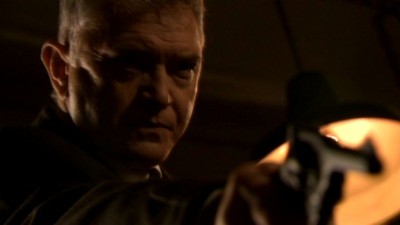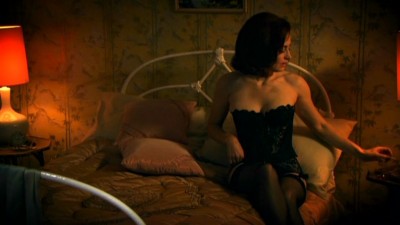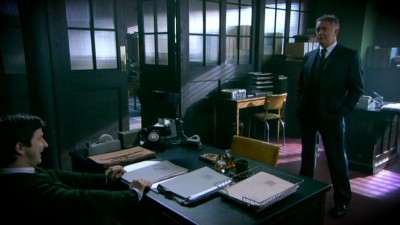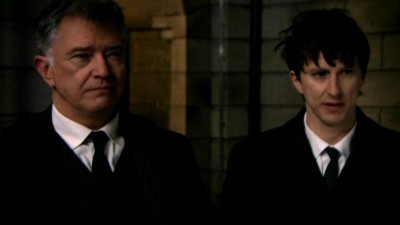| Reviews & Columns |
|
Reviews DVD TV on DVD Blu-ray 4K UHD International DVDs In Theaters Reviews by Studio Video Games Features Collector Series DVDs Easter Egg Database Interviews DVD Talk Radio Feature Articles Columns Anime Talk DVD Savant Horror DVDs The M.O.D. Squad Art House HD Talk Silent DVD
|
DVD Talk Forum |
|
|
| Resources |
|
DVD Price Search Customer Service #'s RCE Info Links |
|
Columns
|
|
|
George Gently - Series 1
A distinct disappointment. Acorn Media has released George Gently - Series 1, a three-disc collection of the 2007-2008 movie-length mysteries adapted from novelist Alan Hunter's Inspector Gently books, and starring British hard-man Martin Shaw as the dogged copper. While the DVD box and slimcases describe "powerful" mysteries set against the backdrop of mid-60s rural Britain, "a region just beginning to feel the rumbles of the era's social and cultural quakes," I saw very little of any of that in these well-photographed but fairly tame, uneventful, even clichéd mysteries. Since England seems to excel in these types of rural mysteries, and with the bar having already been set very high by numerous other such TV mysteries (such as the excellent Midsomer Murders or Foyle's War), there's no need to rate George Gently any higher than what it is: an entirely predictable affair.

Planned as a "series," (which can mean just a few episodes a year in British TV jargon), the first "season" of George Gently consists of three feature-length (about 90 minutes each) films. The premise, laid out in the first movie, Gently Go Man, is fairly straightforward (and distressingly familiar). Commander George Gently (Martin Shaw), grieving over the murder of his wife, Isabella (Maria Tecce), decides to retire from Scotland Yard. He believes his "one-man mission" against gangster Joe Webster (Phil Davis) was the reason for his wife's murder, and disgust with himself (for focusing more on his job than on the potential harm to his family) as well as with the corrupt police officers and commanders who are on the arm with Webster, leave him emotionally broken.
But an entreaty by informant/alcoholic China Mates (Sean McGinley in the first film, Tony Rohr in the last two) to not let Webster get away with the murder - particularly when China hears of another murder up in the rural Northumberland district which sounds like Webster's m.o. - convinces Gently to give police work another try. Requesting to investigate the accident/murder of a motorcyclist in Northumberland, Gently meets his new subordinate, Detective Sergeant John Bacchus (Lee Ingleby), a young, impressionable police officer who Gently fears may go down the same road of corruption and bad police habits he's seen numerous officers embrace back in London - as well as right in Northumberland, too. Taking Bacchus under his gruff, by-the-book, but deep-down tender-hearted tutelage, Gently decides, after cracking the motorcycle case, to stay in Northumberland and keep a steady eye on the unsteady Bacchus.
SPOILERS ALERT!
I'm not familiar with the Alan Hunter series of Inspector Gently novels, so I can't say if these adaptations are "faithful" to the source material or not. But after decades of watching all kinds of TV detectives from both sides of the pond, I can say that George Gently offers absolutely nothing new to the genre, and doesn't come close to the aims set out by its creator or screenwriters. On the first disc in the set, there's a text interview with writer/creator Peter Flannery, wherein Flannery lays out the appeal of the Gently films: Gently is an old-school detective whose values are challenged by the tide of social and political changes sweeping over England during the mid-60s. Okay. Fine. But where is that in George Gently - Series 1? Nothing in the three stories presented, with the possible exception of the first episode featuring the motorcycle gang (with a homosexual leader), illustrates any rising tensions between Gently's old-fashioned values, and the coming counter-culture. Indeed, we're presented with a police commander who is remarkably liberal for a copper from 1964 Britain. He defends the gay motorcycle leader from Bacchus' prejudice; he understands and agrees with Wanda, the sex-starved, sex slave of the IRA assassin when she denigrates all the men who use women for selfish reasons, and he disapproves and even stops the police brutality that was commonplace among some British coppers at that time. So...where, exactly, is that societal "change" coming from, anyway? It appears to be coming from Gently. So the most basic terms of the series, the central core of the show's reason to exist, seems hopelessly turned around, right from the start.

Indeed, what we're left with then, are mystery stories that are numbingly familiar, presented in a manner that isn't even all that compelling - a bigger crime, actually, than having its central theme ass-backwards. Yes, it's annoying that the promised clash between solid, upright Gently and rapidly-spinning-out-of-control Britain never actually happens for one second (because as I stated, Gently is the most "radical" character presented here), but at least couldn't the stories be put over with some verve and conviction, with some plotting that's at least mildly engaging (never mind surprising)? These are old Mannix episodes, really (and that's an insult to Mannix, by the way), with buzz-worthy topics slapped on (that are already pretty played by now on TV, anyway) to gussy up the tired mystery shenanigans. Okay, so a couple of the guys in the first episode are gay. And in the second, a woman has been mistreated by men all her life, while a cop may be putting his career first over the safety of the public. And in the third, Gently finds out that there are still Englishman who (gasp!) hate Germans. Just because the stories in George Gently are set in 1964, doesn't make introducing these topical themes topical in 2007. If George Gently had been made in 1964 with those themes, that would have been something. However, now...it's old hat.
The scripting and direction, too, fail to make any kind of impact in George Gently. It's bad enough that the stories often just "start" without a decent amount of backstory, but shouldn't the premiere episode, which sets up the whole premise of the show in the first place, be properly grounded? All we know of Gently's mission to wipe out gangster Joe Webster (while dealing with police corruption)...is Gently's one-sentence reference to that struggle. We never even see Webster in connection with the murder of his wife, so we're not involved in the slightest as to Gently's anguish and torment. Who's Webster? What has he done as a criminal? What makes him so evil? We're not told. And frankly, who the hell is Gently, for that matter? Or his wife (who has nothing but a glorified walk-on, before she's run over with a car)? What kind of cop was Gently? What kind of wife was Isabella? We don't know. And if we can't get even a scene or two of backstory to ground our emotions in the characters and the story, why should we feel one bit of interest in Gently's subsequent grief?
And it's not enough to explain that sloppiness and brevity away by simply saying, "Well, Martin Shaw is a great actor; he's good in his scenes. He shows intensity." Yes, of course he's a good actor. And yes, he shows intensity. But his scenes don't have a hell of a lot of resonance with me if I don't know who Gently is, or what he means, or what he's about, in the greater scheme of things in the show. There's really no need to even discuss Ingleby's Bacchus character: it's about as broad and clichéd as I've seen in quite some time. And where it isn't clichéd, when the screenwriters try to add some mystery to his character by giving him an unseen wife and unexplained money troubles, the effect isn't one of intriguing the viewer, but rather one of further distancing the viewer with more fuzzy vagueness and unexplained character motivation (some of the other acting, particularly Pooky Quesnel in the critical role of Wanda in The Burning Man, are, to be kind, rather overdrawn).
What I can say in George Gently's favor is that the cinematography is absolutely first-rate. Obviously, a lot of care has gone into rendering the burnished golds and blacks and browns and blues of the dark Northumberland countryside, and the noirish, black-soaked interior sets that give George Gently an interesting patina. But even that compliment comes with a caveat, because despite the glorious lensing, George Gently's period detail is decidedly lacking. Perhaps it's the limited British TV budget (period props and cars and other production design details are kept to an absolute minimum, with outdoor shooting kept high to eliminate the need for properly dressing sets), or its often ridiculous musical scoring (for instance, when Bacchus mentions male contraception, a Mickey Mouse "dingle" is cued up for our hearty laughs), but George Gently never "felt" like it was set in 1964. None of the actors seemed to inhabit that time frame, nor did the measly production design trick me into believing this wasn't 2007, but 1964. There just wasn't any of that period atmosphere that should have been the last-fall back for George Gently to succeed. But with a flawed central theme, shoddy, poorly designed and executed scripts, and dispirited, unfocused acting, ultimately, skimpy period flavor should have been expected of George Gently.

Here are the three movie-length episodes of George Gently - Series 1, as described on their slimcases:
Gently Go Man
Embittered by the hit-and-run murder of his beloved wife, Gently plans to collect his pension and fade into a lonely retirement. But after learning the whereabouts of his wife's killer - the sadistic criminal mastermind Joe Webster - Gently sets off for Northumberland, bent on justice. There, his investigation leads him to murders among a motorcycle gang, and his reputation as an anticorruption crusader proves threatening to the local constabulary.
The Burning Man
Gently and Bacchus try to determine the identity of a body found in a wooded area, shot once through the head and then burned beyond recognition. Their only clue is a gold ring inscribed with the name "Wanda" found in the victim's stomach. Adding to the pressure, a disreputable man named Empton from the Criminal Investigation Department's Special Branch befriends Bacchus and takes a peculiar interest in Gently's investigation.
Bomber's Moon
Shot down over England and billeted with a kindly farm family during the war, pilot Gunter Schmeikel returns to Northumberland to visit her former captors, now his friends. The joyous reunion turns tragic when Schmeikel's body is fished out of the harbor. Investigating the murder, Gently and Bacchus confront long-simmering anti-German sentiments among the locals and Gunter's coldly arrogant son.

The DVD:
The Video:
George Gently - Series 1 is presented in an anamorphically enhanced, 16:9 widescreen transfer that, although interlaced, still looks quite good. Colors are beautifully toned, while blacks remain fairly solid. Image sharpness is high.
The Audio:
The Dolby Digital English 2.0 stereo track actually has a few directional effects to its otherwise average sound design. Levels are appropriately mixed, with all dialogue cleanly and crisply rendered. Acorn Media, in what I hope is a steady trend, has provided subtitles for these movies, which is a big plus when navigating some of the thicker accents.
The Extras:
The only extras for George Gently - Series 1 are some text interviews with Martin Shaw, Lee Ingleby, and Peter Flannery, with a brief text bio of Shaw. Pretty slim pickings.
Final Thoughts:
More effort was expended in how George Gently - Series 1 looked, than how it sounded and played. It's beautifully lensed, that's for sure, but almost nothing else about this mystery series about a copper in rural 1964 England makes much of an impression. You've seen it all before - and done better, as well. Avid British mystery fans may want to rent, but everyone else can skip George Gently - Series 1.
Paul Mavis is an internationally published film and television historian, a member of the Online Film Critics Society, and the author of The Espionage Filmography.


|
| Popular Reviews |
| Sponsored Links |
|
|
| Sponsored Links |
|
|
| Release List | Reviews | Shop | Newsletter | Forum | DVD Giveaways | Blu-Ray | Advertise |
|
Copyright 2024 DVDTalk.com All Rights Reserved. Legal Info, Privacy Policy, Terms of Use,
Manage Preferences,
Your Privacy Choices | |||||||















